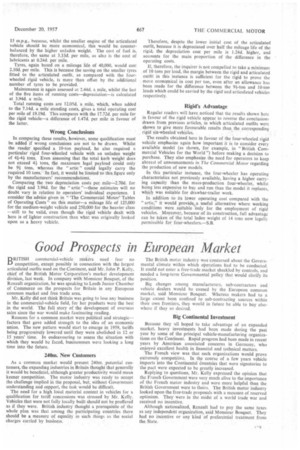Good Prospects in European Market
Page 53

If you've noticed an error in this article please click here to report it so we can fix it.
DRITISH commercial-vehicle makers need fear no
competition, except possibly in connection with the largest articulated outfits used on the Continent, said Mr. John P. Kelly, chief of the British Motor Corporation's market development division, last week. In company with Monsieur Bosquet, of the Renault organization, he was speaking to Leeds Junior Chamber of Commerce on the prospects for Britain in any European common market and free trade area.
Mr. Kelly did not think Britain was going to lose any business in the commercial-vehicle field, for her products were the best in the world. The full story of the development of overseas sales since the war would make fascinating reading.
Reasons for a common market were political and strategic— factors that gave added strength to the idea of an economic union. The new pattern would start to emerge in 1959, tariffs being progressively lowered until they were abolished in 12 or 15 years' time. In endeavouring to assess the situation with which they would be faced, businessmen were looking a long time into the future.
240m. New Customers
As a common market would present 240m. potential customers, the expanding industries in Britain thought that generally it would be beneficial, although greater productivity would mean keener competition. The motor industry was ready to accept the challenge implied in the proposal, but, without Government understanding and support, the task would be difficult.
The need for a high local material content in vehicles for a qualification for tariff concessions was stressed by Mr. Kelly. Vehicles that were not fully locally built should not be proffered as if they were. British industry thought a prerequisite of the whole plan was that among the participating countries there should be a measure of equality in such things as the social charges carried by business.
The British motor industry was concerned about the Governmental climate within which operations had to he conducted, It could not enter a free-trade market shackled by controls, and needed a long-term Governmental policy that would clarify its position.
Big changes among manufacturers, sub-contractors and vehicle dealers would be caused by the European common market, said Monsieur Bosquet. Whereas makers had to a large extent been confined to sub-contracting sources within their own frontiers, they would in future be able to buy elsewhere if they so desired.
Big Continental Investment
Because they all hoped to take advantage of an expanded market, heavy investments had been made during the past year by some of the principal vehicle-manufacturing organizations on the Continent, Rapid progress had been made in recent years by American associated concerns in Germany, who enjoyed excellent health in financial and technical matters.
The French view was that such organizations would prove extremely competitive. In the course of a few years vehicle imports into the Continental countries that were signatories to the pact were expected to be greatly increased.
Replying to questions, Mr. Kelly expressed the opinion that the French Government were very much alive to the importance of the French motor industry and were more helpful than the British Government were to theirs. The British motor industry looked upon the free-trade proposals with a measure of reserved optimism. They were in the midst of a world trade war and received no incentive.
Although nationalized, Renault had to pay the same taxes as any independent organization, said Monsieur Bosquet. They had no incentive or any kind of preferential treatment from the State.




























































































